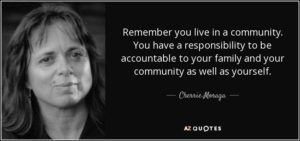
In this week’s reading, “Queer Aztlan” by Cherrie Moraga, she talks about herself, the Chicano Movement, The Gay/Lesbian/Transgender Movement and fitting into these movements despite what anyone said. Cherrie also brings up Chicana Feminism and how that helped her accept who she was. The into to her essay she explains that “Queer Aztlan” was being made in her mind for about three years with the help of Ricardo Bracho. Cherrie states, “We also talked about Chicano Nationalism, which never accepted openly gay men and lesbian among its ranks” (Moraga, pg. 225). To me, this statement she made was strong because I can imagine being in her place. She probably felt like she could not be open about her sexuality because she would be judged and not accepted within her own community and race. Cherrie and Ricardo talked that they needed a Chicano homeland that accepted all its people and their joteria (gayness). They came to a realization that maybe The Chicano Movement was dead. They believe this because for generations many Chicanos are dating and marrying non-Chicanos, the population goes down and they also forget their culture. Cherrie says that she “mourns” the dissolution of an active Chicano Movement for this reason. Another statement Cherrie brings up that stood out to me was, “If women’s bodies and those of men and women who transgress their gender roles have been historically regarded as territories to be conquered, they are also territories to be liberated” (Moraga, pg. 227). Because this is what Feminism is all about. Just like men want to be accepted as these Macho men, then women should also be liberated and accepted to be strong just like men. Gender roles should not be applied. What do you guys think???

I like how you mentioned that “Cherrie and Ricardo talked that they needed a Chicano homeland that accepted all its people and their joteria (gayness)” because there is a desperate need to be accepted and accepting in general but specifically in the Chicano culture. I think it is ironic on how as a Chicana I was aware that I was some sort of a hybrid, not fully American and not fully Mexican and I know how it feels to be very much aware of the dilemma. Although I myself am not gay, I can sympathize with two close family members who recently admitted/announced they were gay. I purposefully used the terms admitted and announced. One family admitted to being gay after years of rumors and it was in many ways like admitting to crime. I can say that everyone around suffered because there were those who sympathized with him and those who sympathized with his father who had a very specific idea of what it means to be a man. On the other hand I have a family member who announced that she was lesbian and basically said to hell with those who can’t accept who I am. Like wise there were those who supported her and there were those who felt sympathy for her parents who also had a very specific idea of what it means to be a woman. In both cases everyone suffered because some could not seem to get past this ideal woman/man. The emotional turmoil that was brought up from both events is flat out traumatic. I feel that Chicano culture can make a better effort to step away from rigid gender norms. It is important to note that idolized and rigid gender norms make life difficult for everyone and in the end family is suppose to support one another when you can’t trust the outside world.
I think that the Chicano Movement not accepting the Chicanos and Chicanas who were part of the LGBT community was unacceptable. By not accepting them, the Chicano Movement was exclude a part of the community. I find it ironic that the Chicano Movement was standing up against to the discrimination and obstacles Chicanos and Chicanas faced but at the same time they were discriminating and excluding those Chicanos and Chicanas in the LGBT community. By discriminating against the LGBT community the purpose of the Chicano Movement was basically defeated. The concept of Queer Aztlan is also very important. The original purpose of Aztlan was to create a place that the Chicano community could identify with. It was to serve as a way to unite the people. However, this purpose was not served. LGBT Chicanos and Chicanas were being excluded so much that the had to create their own Aztlan to identify with. I also find this ironic that a concept to unite a community can exclude members of the community. I think that the Chicano Movement should have accepted the Chicanos and Chicanas who were a part of the LGBT community in order to actually fully achieve what they wanted.
it was interesting to read Cheríe Moraga deconstruct Chicano Nationalism in order to understand the challenges of those in the LBGT community. The downfalls of Chicano Nationalism was its institutionalized heterosexism, its inbred machismo, and its lack of cohesive national political strategy. The gender conflicts arising out of the preconceived notion of gender roles and Cherríe describes “Queer Aztlán” as a Chicano homeland that would embrace all its people. This is a place that allows people to feel comfortable in their own skin, even especially with the El Movimiento transition to embracing the most patriarchal aspects of its Mexican traditions. This term “Queer Aztlán” allows for the continuous opportunity for “lesbians and gay men to actively redefine familia, cultura, and comunidad.” We need to break down all of these typical “family morals” regarding gender and embrace that fact that people are people and have the right to happiness regardless.